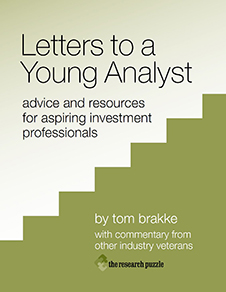
- Wednesday, August 4th, 2010
- combo platters
-
Are you better off being a specialist or generalist? Will your performance improve if you try to get good at one way of investing, and relying on it through thick and thin, or if you draw from a variety of strategies to create something of your own? There have been a number of interesting postings in the finance blogosphere over the last several months that argue for the latter. Here’s a guide to a few of them:
While some investors assiduously avoid forecasting, it is a critical piece in many investment strategies, and a posting from The Capital Spectator looked at the worth of “combination forecasts.”The Capital Spectator | James Picerno has been blogging about investments since 2003. No matter how good an indicator is and how reliable it appears to be in aiding forecasting, “that any one predictor fails at times is unsurprising.” The bottom line: “In effect, investors should diversify the sources of their forecasts.”
When it comes to investing, much research has been focused on identifiable anomalies and trying to capture them. Lots of books have been sold by authors who advocate exploiting them and multitudes of investors have jumped on them over time (arbitraging some away in the process). What would happen if investors diversified across the anomalies? CXO Advisory Group reviewedCXO Advisory Group | This site provides consistently worthwhile reviews of the academic literature. a paper by Erik Hjalmarsson, and their summary of his findings is that “evidence from nearly six decades of data indicates that diversifying across stock return anomalies consistently beats individual anomalies and the broad stock market.”
The Psy-Fi Blog picked up on that paper as well,The Psy-Fi Blog | I like its subhead, “A Sideways Look at Psychology and Finance.” and linked to another one by Zhijian Huang that looks at what might happen if you tried to regularly jump to the best-performing anomaly. (CXO had reviewed the paper too and said, “Anomalies appear to have their own kind of momentum.”) So that’s now a third way: sticking to your guns, combining approaches, or jumping from one thing to another. Perhaps this line from Psy-Fi applies to all three: “Sometimes it's not enough to have a good strategy, you also need to understand why it's a good strategy in order to profit in the long term.”
Or do you? Maybe it’s as simple as following the momentum without thinking too much about it. Abnormal Returns looked at “the momentum paradox,”Abnormal Returns | Among its many other accolades, AR was named the inaugural site of the week on research puzzle pix. noting that it could be that the “ambiguity in definition and causation is in fact the strength of momentum investing.” It certainly seems to rule the day in many market environments, but is it enough on its own? The posting says that even “the most ardent of momentum investors” use it in combination with “other more placid strategies.” And, sure enough, CXO is on the case there too, with a reviewCXO Advisory | The authors of the paper are Cheng-Few Lee and Wei-Kang Shih. of a paper called, “Technical, Fundamental, and Combined Information for Separating Winners from Losers.” The evidence as cited shows that the additional information generated from other investment approaches can improve a momentum strategy.
As a generalist, all of this makes sense to me, but the investment business is made up of specialists by and large. It’s very hard to get some people to use other sources and traditions, and often is counterproductive to try. And, while it sounds good in theory, in practice it can be quite challenging to execute. An earlier email exchange with David Merkel on a related topic reminded me of that. He cited Peter Lynch as one who carved out parts of his portfolio for approaches that worked differently than his natural diet of GARP, and Merkel said Lynch was “canny in integrating styles that would otherwise conflict.” But others, he noted, have not been as good: “When done well, it is a thing of beauty, when done poorly, it is a recipe for mediocrity at best.”
So, no panacea, but the body of evidence suggests that the next time you go to the market diner, you might want to order a combo platter. It’s possible that indigestion may result, but it could very well be that you’ll find a mix of flavors that suits you well.
